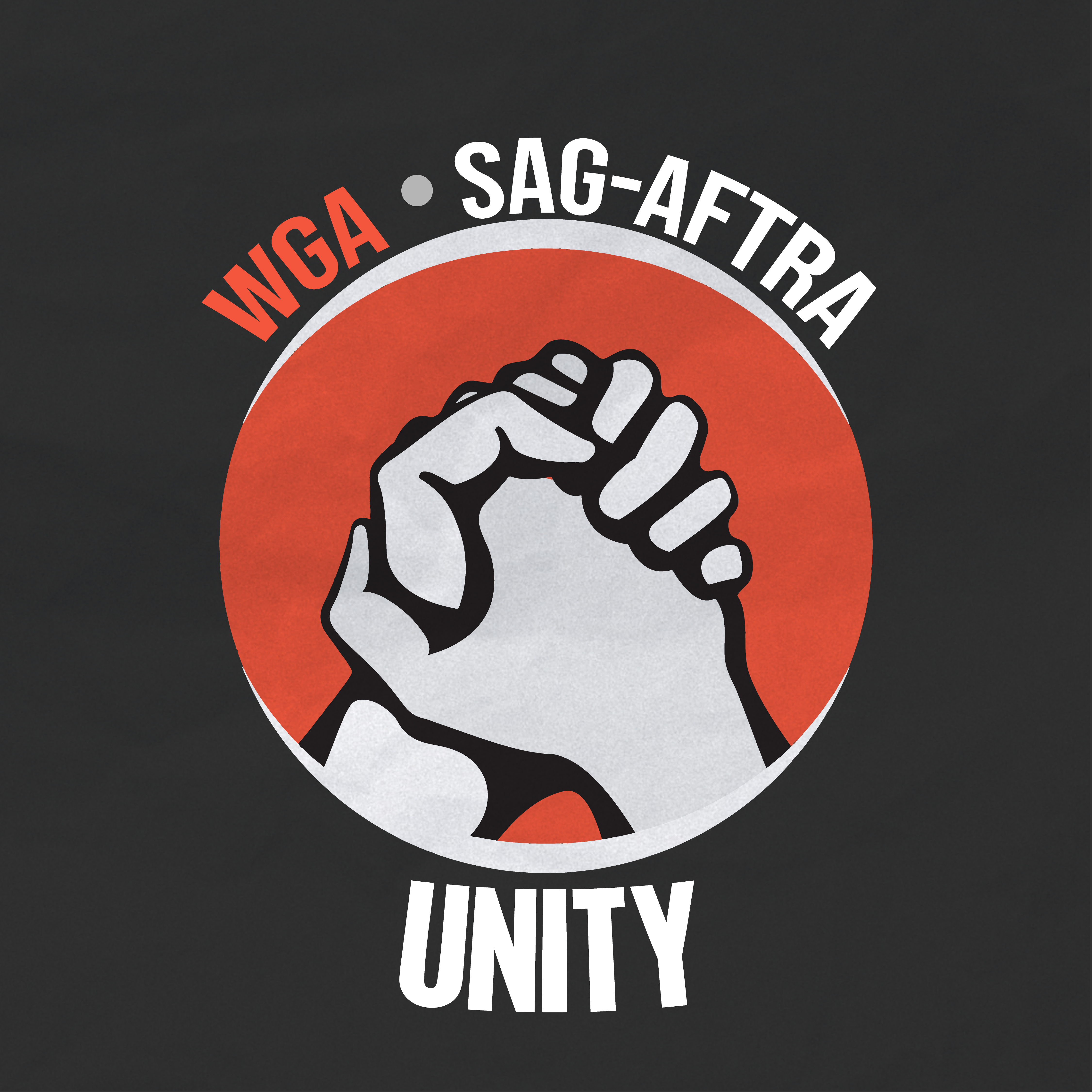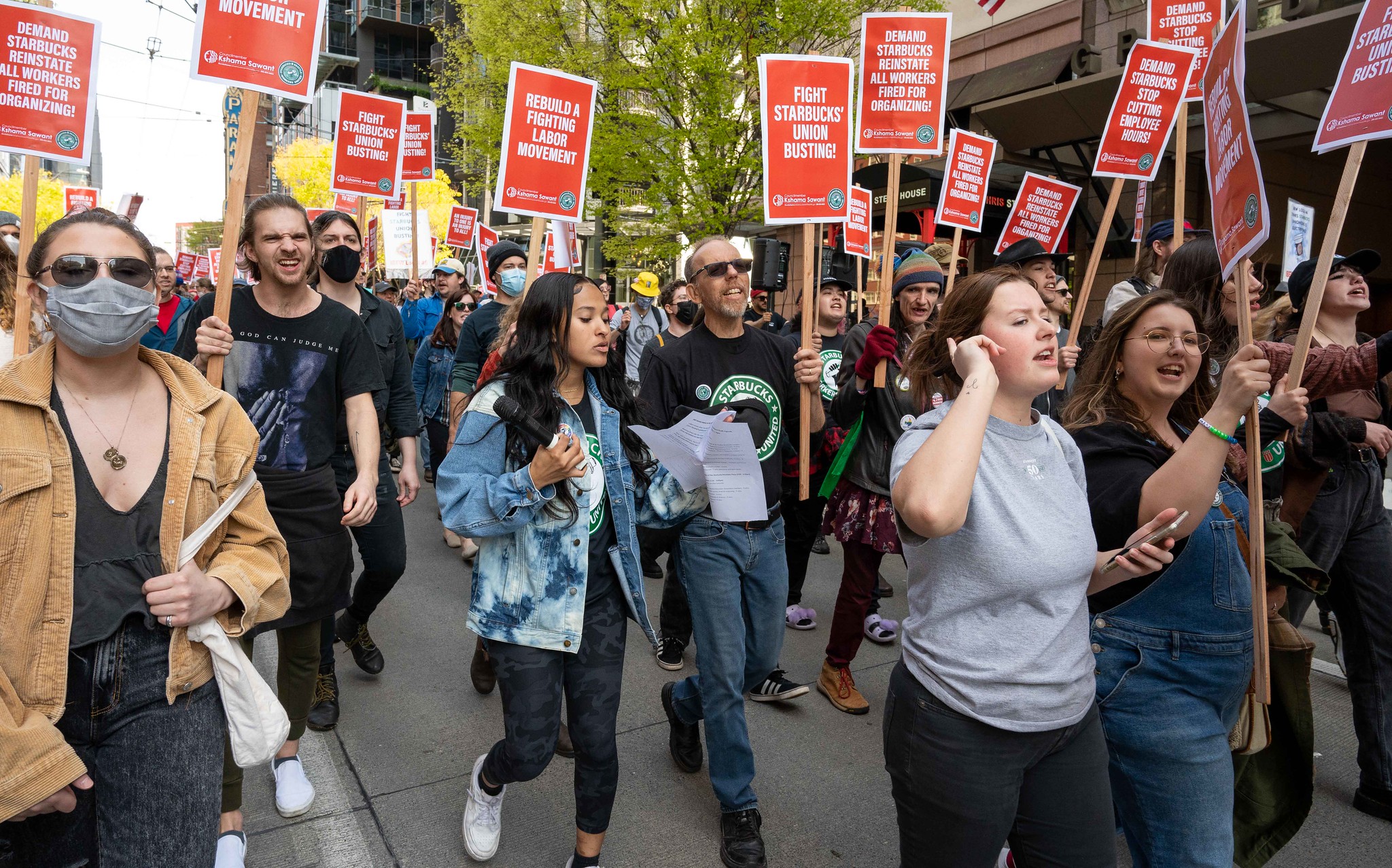How Hollywood ground to a halt
Just when momentum in the writer’s strike began to wane, actors joined the picket line. This unprecedented solidarity has re-energised the movement.
For more than 100 days, the writers behind our favourite films and TV shows have been on strike. After a deal between the Writers Guild of America union (WGA) and the entertainment industry’s official collective bargaining representative, the Alliance of Motion Picture and Television Producers (AMPTP), broke down, 12,000 writers from Hollywood to New York City put down their pens and joined the picket line.
Twelve weeks later, when momentum was beginning to drop, the writers were joined by 65,000 actors unionised with the Screen Actors Guild-American Federation of Television and Radio Artists (SAG-AFTRA), for the first time since 1960, immediately grinding American show-business to a halt and giving the strike a new lease of life.
“I think WGA members on the picket lines, especially since SAG-AFTRA joined us, are more energised again,” says Jonterri Gadson, a comedy writer working on Everybody Still Hates Chris and WGA strike captain based in Los Angeles. “We had been picketing for 12 weeks when they joined so it gave us a huge boost.”
The solidarity between professions is a huge part of why this strike is lasting so long. With work on shows like Stranger Things, Euphoria, The Last of Us and The Handmaid's Tale being paused indefinitely and the California economy taking a reported hit of $3 billion, industry bosses are under much tighter pressure to put an end to the dispute.
‘It’s not about making millions’
“Everything that could have gone wrong in the industry has gone wrong,” says Sean Crespo, an actor and writer living in New York City. Graduating from the London Academy of Music and Dramatic Art in the same class as Benedict Cumberbatch, Crespo has been pursuing an acting career for the past 20 years. But for people like Crespo, who don’t make the top 1% of Hollywood's rich and famous, the industry is becoming unworkable.
“We're going to lose a lot of very talented writers and actors who have found themselves in the industry in the wrong place at the wrong time in their lives,” says Crespo. “They’re going to be thinking, ‘I have a kid, I can't keep doing this,’ or ‘I have elderly parents, and I have to take care of them,’ or ‘I'm just emotionally exhausted from a 20- or 30-year fight and I just can't do it anymore without having guarantees that the work I do earns me residuals, or that I’ll have the chance to get a job a few weeks, not months, later.’”
“The funny thing is, a high percentage of the writers and actors working in TV are working class.”
The two biggest issues facing actors and writers are pay and residual pay. A report by the WGA said median writer-producer pay has fallen by 4% in the last decade, while inflation has risen steadily. Meanwhile, the advent of streaming has meant more writers are now paid below the Minimum Basic Agreement (MBA) – the collective bargaining agreement that covers the benefits, rights, and protections for most of the work done by WGA members – and some writers, including those working on comedy-variety shows for streaming services aren’t afforded those protections at all.
The WGA is calling for an increase of 16% for all minimum pay deals over the next three years, while SAG-AFTRA is demanding 19%. The AMPTP, which negotiates on behalf of the likes of Netflix, Paramount, Disney, Amazon and Apple, has offered 9% to writers and 12.5% to actors.While many of our favourite actors and writers are paid millions, the truth is that the majority of those who work in the entertainment industry are on minimum wage. As Sheryl Lee Ralph, a member of the SAG-AFTRA negotiating committee and Emmy-nominated actress, told Vanity Fair, the strike isn’t about rich people “making more millions of dollars.”
“A high percentage of the writers and actors working in TV are working class,” says Gadson. “We get paid a high weekly wage, but it’s only for 20 weeks out of the year, so it has to last until your next job, and you have no idea when that will be.” While the industry looks glamorous on the surface she says, “it’s really just people going to work in a creative profession and hopefully trying to make it into the middle classes.”

This is compounded by the fact that residual pay for series’ and films being aired on streaming platforms is much lower than those on broadcast channels. Residuals are paid to writers and actors who worked on a film or TV show for reruns or other airings of their work following the initial release date.
“The way it works, at least on broadcast TV, is, when they show reruns, we get 100% of our script fee again, so you get paid when it re-airs,” says Gadson.
However, the advent of streaming has left actors and writers short-changed. “On platforms like Netflix and Hulu, they'll play our thing, but because it's not a rerun, we don't get as much money,” Gadson adds. “We get [paid] way less for things being on streaming.”
To remedy this issue, the WGA is calling on the AMPTP to standardise compensation and residual terms for feature-length films whether released theatrically or on streaming and increase residuals on “undercompensated” reuse markets such as streaming platforms.
For lower-paid actors and writers, broadcast residuals have acted as a lifeline. “I’ve had a lot of small parts in TV shows like a guest star or co-star, and the thing that allows you to survive after you've shot those things in the US is residuals,” actor Sam Crespo says. “I was the voice of a major coffee brand for about four years, for example, and that got us through a lot of tough times.”
With those who work in the entertainment industry practically forced to live in either New York or Los Angeles – two of the most expensive cities in the world – it’s no surprise so many have decided to take a stand. If they don’t, they’ll have to seriously consider leaving the industry.
A ‘gig economy’
Not only is pay lower, but longer production times for much shorter seasons for shows on streaming platforms (6-12 episodes vs the 22-24 episodes of television’s past) means writers, who are typically paid per episode, need to make a smaller amount of money stretch much further. Writing rooms are getting smaller, too. “They're trying to make it so there's fewer writers doing more work for less time, which means we get less money overall,” says Gadson.
“Some writers are the sole voice of a show and others work with only a small team. The WGA’s proposals would preclude that.”
The advent of “mini-rooms,” which have become popular among studios in the past five years, has sparked fears that the entertainment industry is essentially becoming a gig economy. Mini-rooms are where a small, exclusive group of writers are hired to work on a script for a show that hasn’t been green-lit, with no confirmation that the show will go ahead or that, if it does, they will be hired to work on it. Only a couple of the more experienced writers employed in mini-rooms will continue to work on a show, while the others, mostly younger writers, are left looking for their next gig.
This is something Gadson, a staff writer who has been working in the industry for nearly five years, has experienced firsthand. “I'm a lower level writer, and a lot of us get trapped repeating those levels, so that means you're not moving forward, and then you're not increasing your salary,” she says. “It's very hard to get a promotion from the bottom level to the second level, because that's the biggest jump in pay and it's not in the budget that's coming from the studios because showrunners are loading the rooms up with higher level writers.”
The WGA has proposed a solution of implementing staffing minimums of at least six writers on a series of six episodes, with an additional writer for every two extra episodes. This is a major sticking point for the AMPTP, which said the proposals would mean it would have to hire writers whether they were needed or not. “We don’t agree with applying a one-size-fits-all solution to shows that are unique and different in their approach to creative staffing,” it said. “Some writers are the sole voice of a show and others work with only a small team. The WGA’s proposals would preclude that.”
Actors face a similar issue in that they are often forced to agree to be “on hold” for small parts. “You have to tell your agent that you agree to be on hold and that you will not accept any other work,” says Crespo.“It can be two months, I've seen it be three months, and depending on the role, it can be even longer.” Actors will be given an allotment of time for when their part will be shot, which they need to agree to remain free for. The problem, Crespo notes, is that “these dates change all the time.”
“There’ll be so many times when you book a job and they’ll be like, ‘hey, I know I said shooting starts on the 8th, but now it’s the 24th, can you still do it?’, and with so few jobs, you say yes, and you do it,” he adds.
Replaced by AI
“One of the studios’ rock bottom proposals was that they could capture the likeness of a background actor and they get to use it in perpetuity.... It's so evil, but so drab.”
AI is also a major issue for both the WGA and SAG-AFTRA, who are demanding better regulations on the technology. The WGA wants the AMPTP to “regulate use of artificial intelligence on MBA covered projects,” meaning “AI can’t write or rewrite literary material; can’t be used as source material; and MBA-covered material can’t be used to train AI.” In response, the AMPTP offered to hold “annual meetings to discuss advances in technology.”
Gadson believes the AMPTP’s reluctance to regulate on AI must mean it would hinder their plans to use it. “AI can write, and I feel like it writes well enough for [the studios] because they don't know what it takes to write stories that are impactful, and it's the humanity in them that connects with people,” she says. “I think it is a big deal, because the people at the top who are only looking at money just want to get a script out there, and AI is good enough for that, but that would eliminate our profession.” She adds that using AI to write a script (or anything, for that matter) amounts to plagiarism. “Who's getting credit for where the AI is pulling that information from?” she asks.
Meanwhile, SAG-AFTRA has called AI an “existential threat” to actors, especially background actors, who worry that their likeness could be used across multiple shows and films following a single day of filming. “One of the studios’ rock bottom proposals was that they could capture the likeness of a background actor, and you get paid one time, and they get to use it in perpetuity for anything they want,” says Crespo. “It's so evil, but so drab.”
However, a spokesperson for the AMPTP said that the studios’ proposal has been mischaracterised, saying it "only permits a company to use the digital replica of a background actor in the motion picture for which the background actor is employed. Any other use requires the background actor's consent and bargaining for the use, subject to a minimum payment.”
Unwavering picket lines
With the strike lasting so long, it's no wonder some workers are feeling perturbed. “It’s my first time taking part in a strike, where I had a paycheck and have abandoned it for a cause,” says Gadson. “There’s been ups and downs: first we were motivated and excited to be striking back and, after a few months, we’re wondering if anything will even happen.”
"We're already doing the hardest thing, which is abandoning our paychecks and withholding our work, but it doesn't mean we have to be miserable out there.”
That said, picket lines are still bustling, with appearances from higher profile actors and writers like Pete Davidson, Rachel McAdams, Lupita Nyong'o and Mark Ruffalo, as well as cross-union solidarity from the likes of the nurses unions and Teamsters, buoying those taking the risk.
“Being on the picket line is great, it's one of the upsides to this whole nightmare because you get to get to see all your friends in your respective fields of writing and acting and the energy is awesome,”says Crespo. “Some pickets can be a bit of a drain in the heat, because of the direct sun, but even there, everybody's hooting and hollering and just protesting the heck out of it. It’s wonderful.”
Gadson adds that, with people attending the same picket lines week in and week out, there’s a sense of community building. “There's a lot of camaraderie, people are talking and meeting and so it is like a community at the picket lines,” she says. “We’re going to be out there. We're already doing the hardest thing, which is abandoning our paychecks and withholding our work, but it doesn't mean we have to be miserable out there.”
Understandably, and like many others, Gadson says that she is financially worried – “but I know at the end of this, my career – and everyone else’s careers – are going to be better off.”
If you would like to show your support for striking writers and actors, or find out more, you can check out these resources:
- Sign the WGA's petition and find out more information about what you can do to support.
- The Entertainment Community (formerly the Actors' Fund) provides temporary financial assistance to affected entertainment industry workers with documented financial need.
- Pledge your solidarity (SAG-AFTRA).
- The Motion Picture and Television Fund offers supportive services including needs-based temporary financial assistance to qualified industry members.
- Join the Snacklist and support the picket lines by fuelling strikers with food and drink.
- Check out the WGA and SAG-AFTRA social media strike toolkits.
The Lead is now on Substack.
Become a Member, and get our most groundbreaking content first. Become a Founder, and join the newsroom’s internal conversation - meet the writers, the editors and more.




